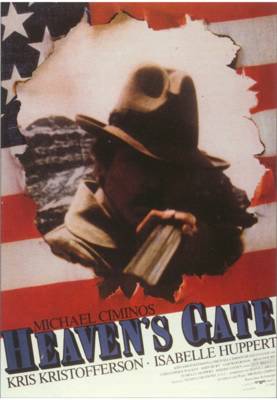Heaven's Gate

Most people who love the movies know the story of Heaven's Gate. Here it is again in a nutshell. After winning three Oscars for The Deer Hunter (Best Picture, Best Director, Best Supporting Actor), director Michael Cimino went on to write and direct a western epic about the Johnson County Wars. Due to massive cost over runs and film delays (some say mainly due to Cimino's perfectionism: Case in point, after 5 days shooting they were apparently 4 days behind schedule.) the film ended up being 44 million dollars (don't laugh, that was an unheard of amount of money to spend on a film in 1980) and 5 1/2 hours long. This was eventually pared down to 3 hours 40 minutes. After the Deer Hunter, critics were expecting the second coming of christ (which wouldn't happen until Mel Gibson, 2004) and lambasted the film so bad that the studio waited on the film for another 8 months, and chopped it down by an hour. Nobody went to see the film when it was released, and United Artists, the studio, went backrupt and was bought at fire-sale prices to MGM.
So how is the film? Well, I liked it. A lot. The class struggles in the film between the rich corporation (i.e. state-sanctioned rape of the working class) and the poor immigrant farmers is as relevent today as it was in the 1890s. I loved the contrast between the Harvard graduation celebrations and the frontier life celebrations. The frivilous game of defending bouquets of flowers with concentric rings of faculty holding hands while the students try to grab the flowers for honour is nicely revisited as a bloody game of survival as the residents of Johnson County defend their escaping families and attack the 50 odd armed bounty hunters. The love triangle of Kris Kristofferson's rich man behaving like a poor man, and Christopher Walken's poor man behaving like a rich man with Isabelle Hupert's confident middle class prostitue is as interesting for it's relationship dynamics (she charges Walken's character for sex so as to no be 'cheating' on Kristofferson's) as for it's symmetry.
I loved the dusty, gritty look of the old west which had it's islands of civility in a harsh wilderness (expressed explicitly with the repeated 'wallpaper' on a tar shack home of Walken's character). Because the epic film is on the rise again and now the cast of thousands are created digitally, as well as much of the sets, to see this film which does actually employ a cast of thousands, real steam trains, fully constructed towns, etc. makes it stand out as all the more well realized. The film, with the help of and admittedly long run-time has a submersive effect into the evirnment I've not had since Das Boot. For that I give it whole credit. It forgives the underdeveloped characters such as John Hurt's broken Harvard valedictorian who cannot resolve his moral failures other than with a smart mouth and too much drink, or Jeff Bridges' tavern owner who is supportive of Kristofferson's defence of the town, but never feels like much beyond that. It seems that Cimino enlarged Bridges role due to his excellent performance...Huh? (And believe me, I'm a huge Jeff Bridges fan, here he is just, well, there...)
The last 10 minutes ran a bit too vindictive and hard to swallow, and tragedy for the sake of following the Shakespeare mold of 'nobody gets away alive'. But overall, why this film was bashed into oblivion is beyond me. It stands up there with many of the 1970s gritty epics (I would watch Heaven's Gate over Godfather Part II any day of the week) and was way ahead of it's time as an Anti-western. Much of the same aesthetics and messages are revisited in Clint Eastwood's Unforgiven and Kevin Costner's Open Range, both of which came out more than 11 and 23 years (respectively) after Heaven's Gate.
A couple more notes of trivia on Heaven's Gate:
1. The actual story that the film was based on, the government stepped in after the first couple murders, rather than here where the goverment is behind the 125 man death list from start to finish.
2. The film features a lot of brutality to animals. There is a stunning Cock fight at one point in the saloon which is most definitely not staged. So many horses were hurt or killed in the big battle sequence in the film that animal groups stepped in and from that point on, there had to be a Humane Society observer on films to prevent such abuse (you know that clip at the bottom of the credits: 'No animals were harmed in the making of this film').

1 Comments:
While I'm long over-due for a re-watch of God Father II, it just did not feel like it extended the story much beyond the first one. I know what I say is blasphemy against the commonly accepted view of GFII as being worthy of the first one. I was so enthralled with the first Godfather that the broken structure (Michael's story intercut with the Robert de Niro as Vito flashbacks) didn't do anything for me.
Perhaps my praise for Heaven's Gate is somewhat based on my low expectations going in (vs. high expectations for GFII).
Post a Comment
<< Home